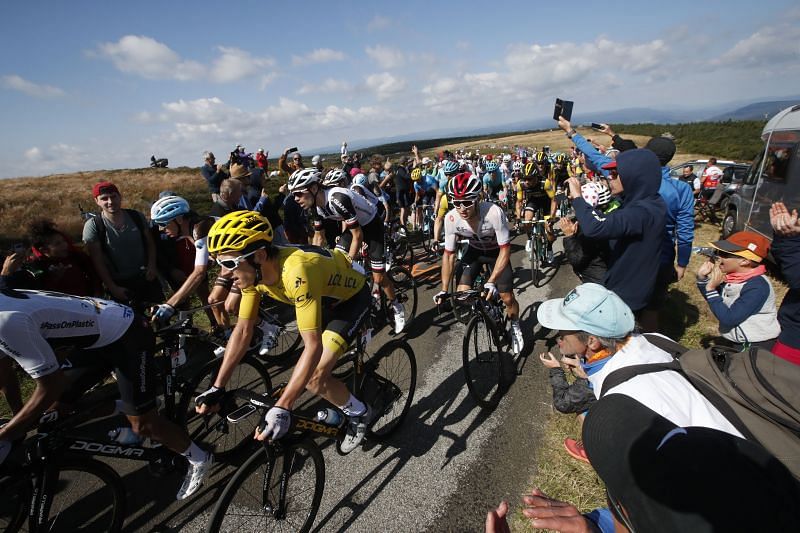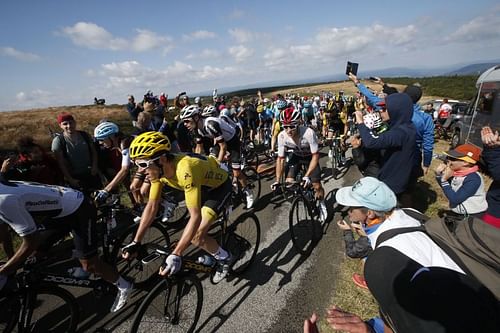
Tour de France seeking more action from innovative stages

CARCASSONNE, France (AP) — Tired of watching cycling races where nothing ever seems to happen?
The Tour de France thinks it has some solutions to liven up the action: Shorter mountain stages, intermediate bonus sprints, and a Formula One-like grid start.
"Spectators are becoming more and more demanding and they want to see real excitement," says Luca Guercilena, general manager of the Trek-Segafredo team.
"Endurance is a big part of cycling. But if we're able to mix the strain of longer stages with shorter legs that allow space for more attacks, a good mix could be the winner."
While mountain stages in the Tour are traditionally more than 150 kilometers (100 miles) or longer — sometimes beyond 200 kilometers — this Tour features two legs that are relative sprints by comparison.
Stage 11 last week, a 108.5-kilometer leg from Albertville to the La Rosiere ski resort, saw elite riders such as Alejandro Valverde attack from far out, forcing Team Sky to increase its pace far earlier than it would have liked.
Stage 17 on Wednesday from Bagneres-De Luchon to Saint-Lary-Soulan Col du Portet in the Pyrenees promises to be even more unpredictable at just 65 kilometers over three grueling climbs, including an uphill finish.
"It's not really been done before so it's going to be tough. It's basically up, down, up, down, up — 2 1/2 hours full gas racing," says Geraint Thomas, the Team Sky rider wearing the yellow jersey. "I'm sure it will be good to watch, maybe not to race."
On longer mountain stages, the top-placed riders usually wait until the final climb to swing into action, saving precious energy in the preceding hours for what they hope will be a decisive attack with the finish line approaching.
"What eventually you want to see is that the race goes on and that the best case scenario is that the big boys make the clash between each other. ... It is the future of cycling, I think," says Tom Steels, the Quick-Step team sports director and a former rider who won nine Tour stages over his career. "In stage races, the shorter they are, the better it is."
With Sky dominating the Tour in recent years and easily chasing down any attacks from far out, the shorter stages should lessen the British team's ability to maintain control.
"On a 200-kilometer stage, riders probably won't attack on the first climb. But if it's 110 kilometers, anything can happen, even for the GC contenders," says Franco Pellizotti, the Italian who at 40 is the oldest rider in this Tour.
One of the downsides of shorter mountain stages is that muscular sprinters have a tough time keeping up with the leaner climbers.
Sprinting standouts Mark Cavendish and Marcel Kittel each failed to make the time cut in Stage 11 and were eliminated from the Tour.
But the Tour has tried to provide more opportunities for sprinters, too, by adding intermediate time bonuses in the first nine stages of this race. Usually placed between 15 and 30 kilometers before the finish, the intermediate sprints award time bonuses of three, two and one seconds to the riders who cross first, second and third, respectively.
"So close to the (finish), it's all about, 'Do I go for it or not?' Maybe if they put it earlier in the race it could have been a bigger battle," Steels says. "There is some interest there."
Another innovation, a grid start, will be tested in Stage 17, the short mountain leg.
The top 20 riders in the standings will start first, with the yellow jersey wearer in pole position, while lower-ranked riders will be forced to begin in four more groups further behind.
"It's still a team sport. They won't attack from the starting line," Steels says, adding that the only instance where an immediate attack could occur is if one team has four or five riders in the top 20. "Then you have a team in the front. This could make a difference."
Still, with climbing right at the start of such a short stage, riders will have to warm up on stationary rollers for up to an hour so they're ready to ride full on from the go.
"I don't know how you prepare," Thomas says. "You try and be as fresh as possible going into that day. Just get stuck in and hope for the best, I guess."
First, though, there's an old-fashioned slog through the Pyrenees in Stage 16 on Tuesday, a 218-kilometer leg that could last for six hours.
Thomas enters with a 1 minute, 39 second advantage over teammate Chris Froome, the four-time champion.
___
Associated Press writer Ciaran Fahey contributed.
___
More Tour de France coverage: https://apnews.com/tag/TourdeFrance